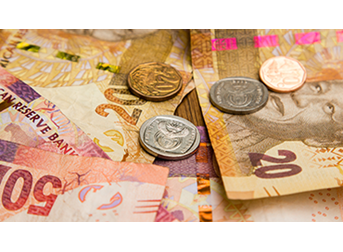Doing business in South Africa



How we can help your business make its money transfers to and from South Africa
Forward Contract
Forwards allow you to buy currency on an agreed future date at a pre-fixed rate. This may require a deposit and allows you to lock in a rate for up to two years.*
Spot Contract
This is an agreement between you and your FX provider to buy currency at the present exchange rate, and it can be used for imminent payments.
FX Orders
If you need a particular exchange rate but have no urgency to purchase straight away, an FX order could help you secure a better deal.
FX Options
Designed for foreign exchange rate management, options can be created as a bespoke solution for your business and its payment needs.**
South Africa’s economy has much to offer prospective investors: it is the second largest in all of Africa, as well as the most heavily industrialised and diversified.
The economy of South Africa plays a significant role in the region. With its impressive range of financial, legal and business services, it is the ideal location for businesses looking to expand their operations. It also boasts an extensive transport infrastructure, making it an ideal gateway to other markets in Sub-Saharan Africa.
South Africa is the UK’s biggest trading partner in Africa: annual trade between the two nations is worth £10.7 billion. This is set to grow further: in November 2022, the UK and South Africa announced that they had joined together in a bid to increase export finance by providing greater opportunities for British businesses to invest and trade.
Let’s take a closer look at doing business in South Africa.
Guide to setting up a business in South Africa
Is South Africa a good place to start a business?
There are numerous advantages of doing business in South Africa. The country offers excellent infrastructure and a welcoming environment that encourages free expression and innovation.
South Africa serves as a gateway to the rest of the African continent, with its burgeoning consumer market of 1.2bn people, and it provides plenty of market opportunities for the countries that border it. A member of the BRICS group, South Africa has been identified as a country whose rapidly growing middle class has increasing spending power.
As with most emerging market economies, the South African economy acknowledges the value of foreign direct investment (FDI), and it has succeeded in attracting such investment thanks to the strength of its diversified economy and the incentives that South Africa provides: the Foreign Investment Grant reimburses up to 15% of the value of new machinery per entity upon relocating to South Africa.
This has driven impressive results: in its fourth-quarter 2021 FDI report released by the Central Bank, it was revealed that South Africa had recorded foreign direct investment inflows of 604.3 billion rands, or $41.15 billion in 2021 – a substantial increase from inflows of 50.4 billion rands in 2020.
How to register a business in South Africa
Private companies are simple and relatively inexpensive to establish in South Africa, and they can be established with only one director. The director need not be resident in South Africa.
There are a number of routes that foreign companies can follow in order to establish a new company in South Africa.
Incorporating a new private limited liability company involves registering a Memorandum of Incorporation (MOI) with the Companies and Intellectual Property Commission (CIPC) for one’s South African branch. This involves reserving a company name and preparing an MOI for the South African subsidiary; this can be completed within a few days.
Other options include purchasing an existing shelf company or registering an external company (branch office).
What are the major industries in South Africa?
More than 70% of South Africa’s workforce is employed in the services sector. South Africa’s financial sector is very impressive: banking is regarded as one of the country’s major strengths, thanks to its strong regulatory regime.
The economy and workforce of this country also depend upon several other sectors, however, including agriculture and food processing, business process outsourcing, and industrial manufacturing and mining.
Manufacturing accounted for 11.79% of national GDP in 2021, making it the nation’s fourth largest industry. Whilst mining has declined in significance (it contributed more than a fifth to GDP in 1980), it is still an important fixture, accounting for 8.2% of South Africa’s GDP in 2020.
What are the biggest opportunities for doing business in South Africa?
There are considerable opportunities for businesses looking to set up shop in South Africa
As a resource-rich nation, there are wonderful opportunities here for businesses in the manufacturing and energy sectors to start doing business in South Africa.
There are also very real opportunities to invest in South Africa’s burgeoning tourist sector by setting up hotels, for example; millions of tourists visit South Africa each year to admire its landscapes and wildlife.
Business etiquette in South Africa
South African business culture generally conforms to business norms in the West. Businesspeople are expected to greet everyone with respect and to arrive punctually for meetings. Whilst South Africans will often engage in small talk, it is common for them to get down to business fairly quickly; meetings can often be rather transactional in nature.
Both men and women tend to wear dark business suits in South African business meetings.
What is the corporate tax rate in South Africa?
The corporate income tax (CIT) rate is a flat 28%, and this applies to the income of both resident and non-resident companies. This rate will be reduced to 27% after 31 March 2023.
There are incentives for small businesses, however, but they are reserved for corporations that meet the requirements, i.e. those that include only natural persons as members/owners and with gross income of not more than ZAR 20 million. For such corporations, the following rates apply:
- 0% on the first ZAR 91,250 of taxable income.
- 7% on taxable income above ZAR 91,250 but not exceeding ZAR 365,000.
- 21% on taxable income above ZAR 365,000 but not exceeding ZAR 550,000.
- 28% on taxable income exceeding ZAR 550,000 (27% for tax years ending on or after 31 March 2023).
Doing business in South Africa with Moneycorp
Moneycorp offers global payment solutions for your business needs and extensive options to protect your money from exchange rate movements. Send money to and from South Africa with ease through our international payment service.
Sign up for a business account with Moneycorp today.
Get in touch & learn more about how we can send money to and from South Africa
Get in touch & learn more about how we can send money to and from South Africa



